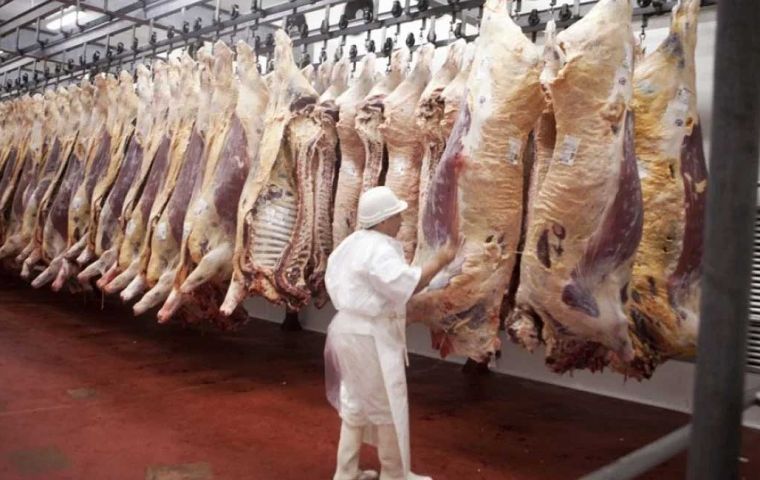MercoPress. South Atlantic News Agency
Argentina lowers levy on beef exports, farmers happy but the overall policy questioned
 The latest numbers from meat exporters shows that China takes 81% of Argentine beef sales, Israel 6%, United States 5%, Germany 4% and Netherlands 3,6%.
The latest numbers from meat exporters shows that China takes 81% of Argentine beef sales, Israel 6%, United States 5%, Germany 4% and Netherlands 3,6%. The Argentine government is lowering beef export tax 25%, from 9% to 6,75% basically “to promote sales to foreign markets and improve the level of income of producers and processors, favoring the insertion of Argentina in international markets”, points out the decree published on Tuesday in the Official Gazette.
The decision from the orthodox libertarian Argentine president Javier Milei partly fulfills the promise to farmers that his administration will reduce and eventually abolish taxes on food commodities of which the country is or has been a formidable global exporter.
In this particular case the decision also means a rapprochement with China, “the communist regime and dictatorship” he so much criticized during his electoral campaign and first months in office, but which is Argentina's main market for meat sales.
The latest numbers from meat exporters shows that China takes 81% of Argentine beef sales, Israel 6%, United States 5%, Germany 4% and Netherlands 3,6%.
However even when the announcement must be music for most cattle breeders and meat processors in Argentina, the CEO of one of the country's largest and global corporations, Techint, with civil engineering contracts all over the world, was particularly critical of China and its impact on Latin America.
CEO Paolo Rocca warned about what he called the “primary” goods no added value economies trap in which Latin American countries and Argentina have fallen because of Beijing's purchasing approach. “There has been a massive production transfer to a non democratic government, with highly centralized and authoritarian policies”
“Competing with China in the last three decades has been virtually impossible, they are only interested in minerals and commodities, while at the same time they flood up with manufactured goods. Yes, it helps combat domestic inflation, but what about industrial production and investment, employment and strong institutions?”, points out CEO Rocca.
“We need to review all of our strategic long term policies,” underlined the Argentine leading businessman. “Basically China wins and we lose as primary goods exporter”.




Top Comments
Disclaimer & comment rulesCommenting for this story is now closed.
If you have a Facebook account, become a fan and comment on our Facebook Page!